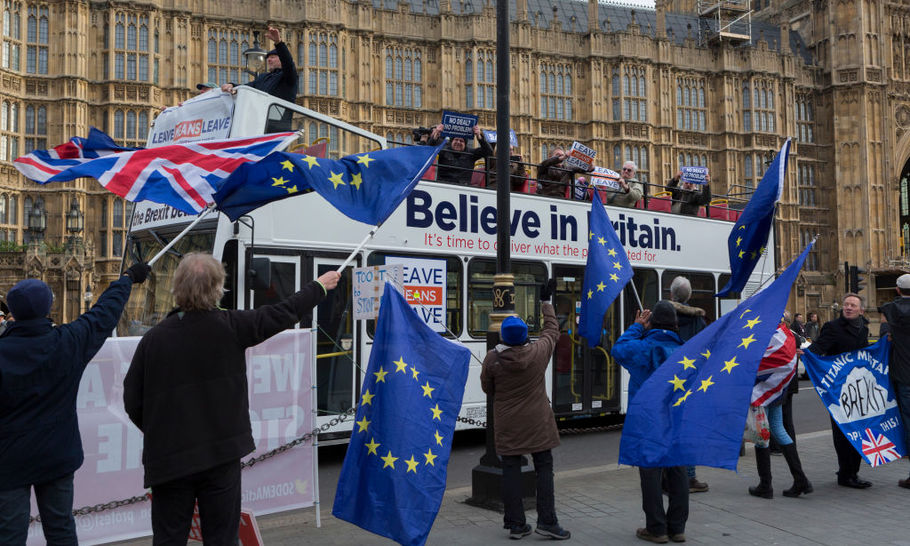A People's Vote may well happen. But remaining is just as complicated as leaving.

Richard Baker / In Pictures via Getty Images
Yesterday’s news that a top EU law officer believes that the UK can halt Brexit by unilaterally revoking the Article 50 notification has got the People’s Vote crowd very excited indeed. And well it might. May’s withdrawal deal is fizzling into oblivion before our very eyes, with estimates suggesting that around 100 Conservative MPs will vote it down next week.
So what happens next? A few arch Brexiteers are clinging onto the hope that we’ll leave the EU with no deal at all (the legal default if parliament can’t agree on a deal by 29th March), but Dominic Grieve’s amendment – which has made any future motion on Withdrawal Act amendable – makes that option a lot less likely.
With Parliament unable to agree on a deal but entirely set against no deal, logic dictates that somehow, eventually, a People’s Vote, backed by the ECJ, might well come to pass.
Of course, as Brexiteers are pointing out, there are still a number of pretty sizeable hurdles for the People’s Vote gang to jump over. In order for a new referendum to take place, they need to find a new Prime Minster willing to cancel Brexit, whip up a Commons majority for a second referendum, and then pass a law in favour of it – all in the 15 weeks before Brexit Day on 29th March.
It sounds like a tall order, but if the Government continues on its catastrophic losing streak and it becomes clear that it is unable to pass any legislation, a vote of no confidence in it, followed by a snap general election, and, perhaps, some kind of emergency pause on Brexit, becomes inevitable. It seems very unlikely that the Tory Party (or what was left of it) could win an election in its current state, so a Labour Government, or a coalition led by Labour, would come into power. Closet Brexiteer Jeremy Corbyn would then, after a lot of pushing from his more wily and ambitious cronies, work out which side his bread was buttered and start supporting a second referendum. In these circumstances, is it such a stretch of the imagination to think that MPs, who, after all, voted two to one for Remain in 2016, would put their weight behind a new law paving the way to a People’s Vote?
As far as the ultra remainers are concerned, that would be job done. The will of the people, they keep telling us, has changed: whatever options appear on the ballot paper (and deciding on that would be a bloody fight in itself), the British people will vote for the course of action which most resembles ‘Remain’.
And from inside the Westminster bubble, it feels like the momentum is with them. In October, up to 500,000 people took to the streets of London marching for a People’s Vote, and opinion poll after opinion poll now backs up their claim that a majority of the country now want to halt Brexit. The Our Future Our Choice gang, the young people leading the charge for a second referendum, are looking smugger than ever – and Jolyon Maugham, the militantly pro EU barrister, is now enjoying an almost daily croon on national TV.
But momentum is a slippery thing. And if MPs do eventually legislate for a People’s Vote, you can count on it that that political kaleidoscope would spin – and fast. At the moment, Remainers are united in campaigning for – and funding the campaign for – a People’s Vote. They have entire teams of professional PR people, event managers and lobbyists working full time to keep up the momentum, and, because there is no official campaign, they are free to spend as much as they like on commissioning opinion polls.
Should a People’s Vote become a reality, that would all change. First, the Remainers, no longer campaigning under the People’s Vote umbrella, would realise that they are just as split, if not more split, than the Brexiteers. There would be those, like the flag wavers on College Green, who would want to use the opportunity to integrate us more fully into the EU. This group has never seen any problem with closer political union, would have been perfectly happy for the UK to join the Euro, and probably think a European Army is a very good idea.
Then there would be the Cameronite Tories, like Nicky Morgan, who support our continued membership for practical reasons, but have always called themselves ‘moderate eurosceptics’, and would be determined, even if only for the sake of their leave voting constituents, to ensure we kept all of the special exemptions wrung out of the EU by successive British Prime Ministers over the last forty years.
Between these two extremes, there would be countless other factions, all with different views on what ‘remain’ means in the context of a European Union which has evolved dramatically since 2016, and will continue to evolve for as long as it exists.
Meanwhile, the Leave politicians, activists and donors, all of whom are currently devoting their attention to the mechanics of getting out, would return to the campaigning with gusto. And, as we saw in 2016, they are good at it. Divided and distracted they may give an impression of weakness, but united in righteous fury, they are a force to be reckoned with.
After a few more months of unprecedented chaos in Parliament, it could well be that one way or another, a People’s Vote becomes a reality. But it would be a mistake to think that there would be an option to wind back the clock to a simpler, pre Brexit age. Leaving is not simple. But neither, in 2018, is remaining.





